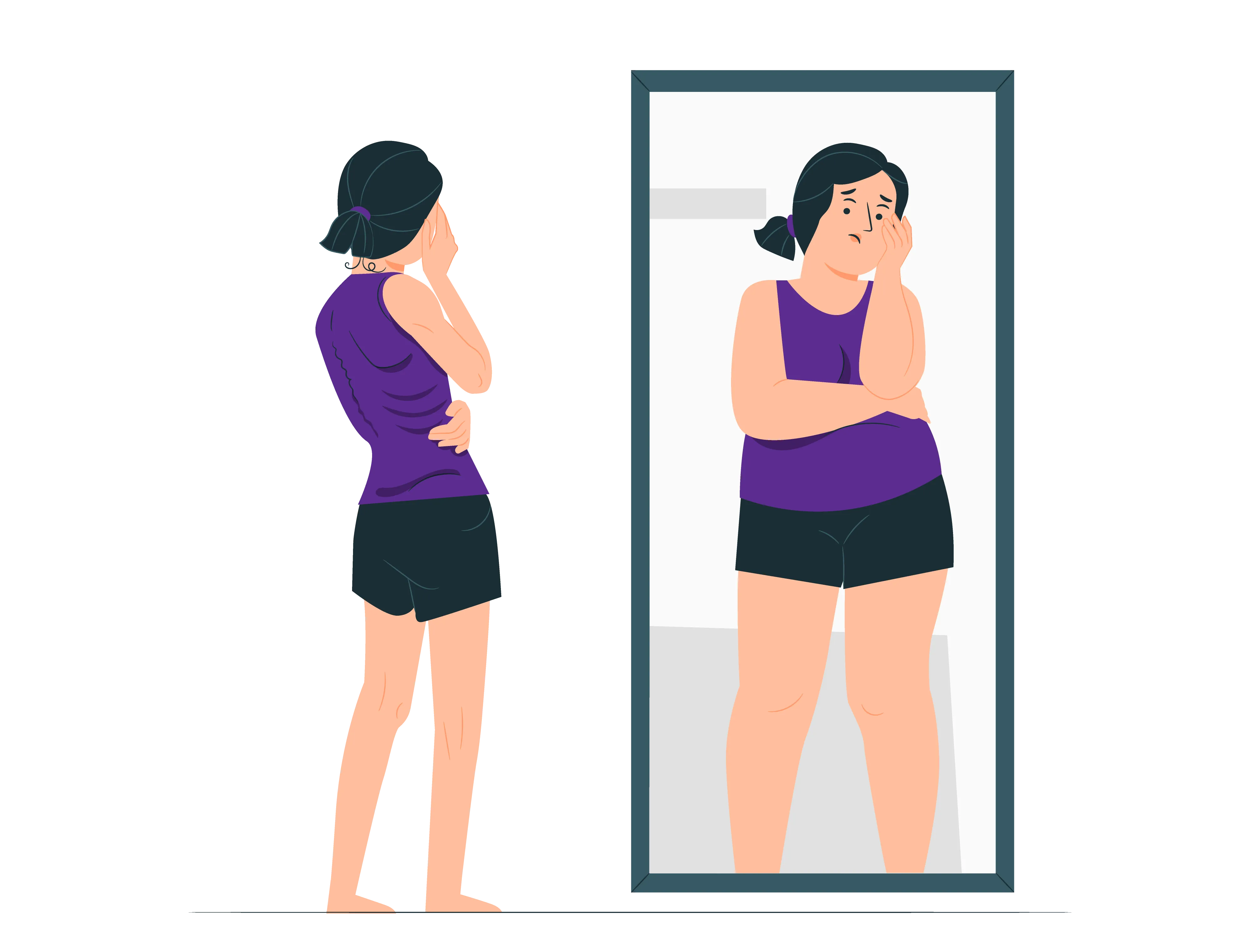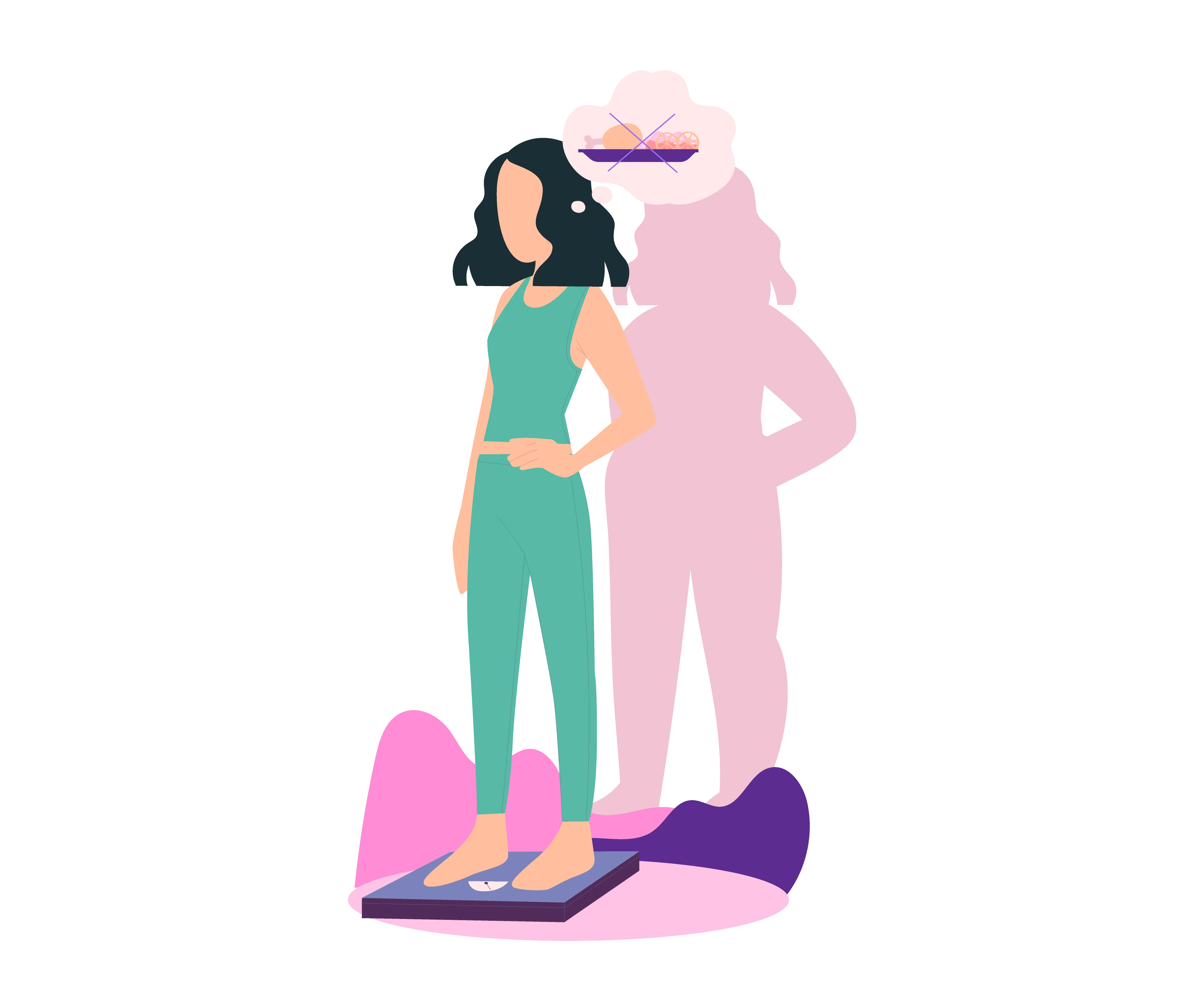Psychiatrist | 5 min read
All You Need to Know About These 4 Common Eating Disorders
Medically reviewed by
Table of Content
Key Takeaways
- Eating disorders are more common in women than in men
- Eating disorders’ causes can be linked to repressed traumas
- Eating disorders’ symptoms vary according to the type of condition
Eating disorders are complex mental health conditions marked by frequent disturbances in eating behavior. They can be linked to repressed traumas and other mental health concerns. People with these symptoms may often need the help of psychological experts. Between the years 2000 to 2018, the number of people diagnosed with eating disorders has increased. The percentage has gone up to 7.8 from 3.4%. [1] This steep rise has made them a common mental illness.
Eating disorders have much more to them than an obsession with certain foods. Our concerns about body weight and body shape may also be the cause. Thus, knowing an eating disorder’s psychology is vital to get to the root of the disease. To know the types, causes, and treatment of eating disorders, read on.
Additional read: 7 Important Ways to Take Care of Your Mental Health
Signs of eating disorder
Eating disorders can present with diverse symptoms, but they typically involve an excessive preoccupation with issues related to food and eating, and some may involve a significant focus on weight.
Behavioral and mental symptoms might be:
- Significant weight reduction
- Constipation
- Cold intolerance
- Abdominal pain
- Lethargy or excessive energy complaints
- Justifications for skipping meals
- Fear of becoming overweight or gaining weight
- Dressing in layers to conceal weight loss or stay warm
- Severely restricting the types and amounts of food consumed
- Refusing to eat certain foods
- Denying feeling hungry or expressing a nebulous desire for food
- Engaging in extreme exercise
- Preparing meals for others without eating
- Skipping menstrual cycles
Physical indicators include:
- Low hormone, thyroid and potassium levels, as well as low blood cell counts
- Anaemia
- Low potassium
- Slow heart rate
- Gastrointestinal symptoms and stomach pains
- Abnormal sleep pattern
- Fainting
- Feeling cold always
- Dizziness
- Menstruation irregularities
- Calluses on the tops of finger joints (a sign of vomiting induction)
- Receding hair
- Weak muscles
- Slow wound healing
- Dry skin
- Dry, thin nails
- Inadequate immune system activity
Different Types of Eating Disorders
Pica
- The eating disorder known as pica involves consuming items that are not regarded as foods and do not have any nutritional value
- People who suffer from pica get urges for non-food items, e.g., dirt, chalk, paper, hair, wool, laundry detergent, ice, soap, linen, pebbles, or cornflour
- Pica can happen to all age groups
- People with a disorder that interfere with everyday functioning, such as intellectual impairments, developmental disorders like autism spectrum disorder, and mental health diseases like schizophrenia, are the ones most likely to experience it
- Pica patients may be at an increased risk of toxic exposure, sickness, intestinal injuries, and deficiency of nutrients. Pica may be lethal, depending on what you eat
Rumination Syndrome
- Rumination syndrome, commonly known as rumination disease, is an uncommon and persistent ailment
- People of all age groups can be affected
- It refers to a condition in which a person consumes previously chewed and swallowed food, re-chews it, and then re-swallows or spits it out. This rumination generally occurs through the first thirty minutes of eating
- It usually develops in new-borns between 3 and 12 months and then disappears
- Rumination disorder in infants can result in severe malnutrition and weight loss, both of which can be fatal if left untreated
- Adults suffering from this disease may reduce their food intake, particularly in public

Muscle Dysmorphia
Muscle dysmorphia is another eating problem that is on the rise. Someone suffering from this illness will be obsessed with the appearance of their muscles. They will go to any length to make their flesh more sculpted and flawless in their eyes.
Compulsive Overeating
Someone who suffers from compulsive overeating is always craving food, even when they are not hungry. They are unable to manage their frequent and overpowering food cravings. This eating problem frequently disrupts routine everyday duties. Some people may find it debilitating.
Pregnancy Anorexia
Pregnancy anorexia, known as pregorexia, occurs in women who become preoccupied with gaining weight throughout their pregnancy. During pregnancy, it is important to be mindful of weight gain and take measures to prevent conditions like gestational diabetes. However, being mindful of insufficient weight is also crucial. Your baby will be undernourished if you don't consume enough nutrients.
Alcoholism Anorexia
Another eating condition with a strange scientific name, drunkorexia, indicates you are both an alcoholic and an anorexic. Someone with this order has a fixed number of calories they desire to consume daily, including calories from alcohol.
To keep inside their calorie limits, they will expel whatever meals they consume. It permits them to consume calories from alcohol. They do not believe that abstaining from alcohol is an option.
Diabulimia
The term "dia" refers to people with diabetes, common among people with type 1 diabetes; diabulimia is a sort of eating disorder. A person with diabetes will alter the prescribed insulin dosage to shed weight. Some people might use less insulin, while others might stop it completely. According to reports, 40 per cent of Type-1 diabetic patients practice diabulimia. [1]
Night Eating Syndrome
You may have night-eating syndrome if you notice that you consume the majority of your calories at night, especially just after dinner. Even when they wake up in the middle of the night, someone with this kind of eating disorder could feel obligated to eat.
Eating Disorder Types
Binge Eating Disorder
This typically develops during early adulthood and adolescence. If you have this disorder, you may have a tendency to eat a large quantity of food in a short time. In spite of knowing the harm it may cause, you may find it hard to control this habit. People with binge eating disorder are usually overweight or obese. This increases your risks of medical complications.
Bulimia Nervosa
In this type, you might alternate between periods of binge eating or fasting. The binge episodes may continue until the time you become extremely full. This usually happens because of the feeling that you cannot stop or control what you are eating. After the binge-eating, you may have the urge to rid yourself of the calories you ate. For this purposes, you may
- Throw up
- Use laxatives
- Use enemas
- Exercise excessively
- Fast for a long time
People with this disorder usually are of the average or normal weight. In some cases they may be underweight or overweight.

Anorexia Nervosa
This usually affects women more than men. People with anorexia nervosa feel that they are overweight despite being underweight. If you have this disorder, you may have an obsession of checking your weight frequently and avoiding foods with high calories. In some cases, people with anorexia also experience OCD. In such cases, you may also hoard food without eating.
Avoidant/Restrictive Food Intake Disorder (ARFID)
Earlier known as ‘Selective Eating Disorder’ [2], ARFID may developed during your childhood and continue or become more advanced during adulthood. It is similar to anorexia and bulimia in the sense that people may restrict what they eat. The key difference is that in ARFID, you may not eat certain foods because of distaste and not because of distress about your appearance. This disease is also equally seen in both women and men.
Some other eating disorders include
- Night eating syndrome
- Pica
- Rumination disorder
Eating disorders’ causes are mainly categorized into 3 types which are [3]:
Causes Behind Eating Disorders
Numerous causes might be responsible for eating disorders.
Genetics is one of them. For example, people appear more susceptible to acquiring an eating disorder if they have a sibling or parent who has one.
Another thing to consider is your personality. Three personality qualities are frequently linked to an increased risk of having an eating disorder: impulsivity, neuroticism, and perfectionism.
Other possible factors include:
Perceived pressure to be skinny
Cultural demands for slimness
Exposure to media that supports these standards
Biological
Biological factors come into play when you have a close relative with a mental illness or an eating disorder. Type 1 diabetes and a history of dieting can also be a cause for eating disorders.
Social
Stigmas around weight and appearance are some of the social factors causing an eating disorder. Bullying and historical trauma also fall under this category.
Psychological
Psychological factors include how you view yourself, the compulsion to be perfect as per common stereotypes, or history of anxiety disorder.
Additional read: 6 Most Common Types of Mental Illness Symptoms to Watch Out For

Symptoms of eating disorders
It is not always feasible to tell if someone has an eating disorder based only on appearance. An eating problem may affect anybody, regardless of height or weight.
Different eating disorders have their respective specific symptoms. Eating disorders sometimes imitate diets, and they can be challenging to identify. Someone battling an eating disorder can be reluctant to discuss their eating issues. You could notice any of these general changes if you or a loved one has an eating disorder:
- Shifts in the mood
- Exhaustion, dizziness, or fainting
- Hair loss or thinning hair
- Regular toilet visits following meals
- Sudden or unexplained changes in weight
- Exceptional perspiration
Other changes can be:
- Eating alone or not wishing to eat with others
- Absence from friends or social gatherings
- Storing food in secret or discarding it
- Obsession with food, calories, physical activity, or weight reduction
- Food customs (eating in secrecy, chewing food for longer than required)
Eating disorders’ symptoms vary depending on the type. Some of the common symptoms are
- Frequent eating
- Fluctuations in weight
- Sleep problems
- Muscle weakness
- Eating small portions or skipping meals
- Feeling uncomfortable about eating with people
How to treat an eating disorder?
There are several eating disorder treatments, and they depend on the type and your requirements. An expert can assist you in addressing and managing food-related difficulties even if you have not been diagnosed with an eating disorder.
Maudsley method
It is one kind of family therapy that supports the parents of adolescents who are anorexic. Parents carefully supervise their children's eating as they develop healthy eating habits.
Psychotherapy
By undergoing therapy, you can identify the source of your negativity and come out of it with the help of cognitive behavioral approach. Therapy also helps you change your thought patterns and build coping skills to help you make healthier decisions. You can opt for group therapy or individual therapy. As per your convenience, go for an in-person or online psychiatrist consultation.
Nutrition Counselling
With this, nutritionists guide you to eat in a healthy way and maintain a normal weight.
Medicines
Antipsychotics, antidepressants, and mood stabilizers are some medicines that help you treat eating disorders. They also support you in dealing with anxiety and depression, which are linked to eating disorders.
Medical Care and Monitoring
This is done when there are complications caused by different eating disorders.
Neurologist Consultation
Research has found that along with behavioral factors, some regions of the brain also cause eating disorders [4]. Since neurologists are experts in treating such conditions, you may get effective guidance from them for a better health. Having an in-person or online neurologist consultation may help you beat or better manage the condition.
Eating disorders can be life threatening. However, with proper treatment and consultation, you can manage them efficiently. Keep an eye on the symptoms and consult a doctor if you have signs. Between an in person or online doctor consultation, you can choose the option that is most comfortable for you. For ease of access, book an appointment with experts on Bajaj Finserv Health, and take a step towards effective healing.
What is the diagnosis of an eating disorder?
Eating disorders get identified by healthcare experts, including doctors and mental health specialists. Your primary care physician could assess your symptoms, do a physical exam, and request blood tests. A psychological examination by a mental health professional, such as a psychologist or psychiatrist, is done to know more about your eating habits and beliefs.
The Diagnostic and Statistical Manual of Mental Disorders (DSM), published by the American Psychiatric Association, is used by professionals to make diagnoses. Each form of eating disorder's symptoms is there in the DSM. An eating disorder doesn't require you to exhibit all the signs. And even if you don't have a specific eating disorder that is there in the DSM, you can still need assistance in resolving food-related problems. [2]
Can eating disorders be self-diagnosed?
The sooner you get therapy if you have an eating issue, the better your chances of healing are. Knowing the warning signals and symptoms might assist you in determining whether you require assistance.
Not everyone will exhibit every symptom at once, but some actions or attitudes may be an indication of a problem, such as:
- Actions or attitudes that show that weight reduction, dieting, and control of one's eating are now the main issues
- Refusal to eat certain foods
- Food rituals (eating only certain food groups)
- Skipping meals
- Eating only small portions
- Preoccupation with weight, food, calories, fats, and dieting
- Refusal to eat certain foods
- Discomfort when eating around others
- Examining the mirror repeatedly for perceived defects in looks
- Severe mood swings
It's critical to seek medical assistance if you experience these symptoms and believe you may have an eating issue. It may feel intimidating to begin eating disorder recovery, but getting help from your community, medical experts, and support groups makes it simpler.
Complications with an eating disorder
The second most fatal mental condition is an eating disorder. Your overall health may suffer due to severely limiting caloric intake, throwing up, or vigorous exercise. You run the danger of developing conditions like:
- Arrhythmia, heart failure, and other cardiac issues if you have an untreated eating disorder
- Gastroesophageal reflux disease (GERD); is often known as acid reflux
- Digestion-related issues
- Hypotension, or low blood pressure
- Organ failure and mental impairment
- Damage to the teeth and osteoporosis
- Diarrhoea and constipation
- Infertility and menstrual periods (amenorrhea)
- Stroke
Preventative measures for eating disorder
Knowing the warning signals is the first step in recognizing the issue early if eating disorders run in your family. Before they become more challenging to overcome, harmful eating behaviours can get treated with prompt therapy. By receiving remedial treatment for issues like depression, anxiety, and OCD, you can also lower your chance of developing an eating disorder.
Set a good example for your family by consuming healthful foods and refraining from categorizing different foods as "good" or "bad." Likewise, do not indulge in making disparaging remarks about your physique.
References
- https://www.singlecare.com/blog/news/eating-disorder-statistics/
- https://www.nationaleatingdisorders.org/learn/by-eating-disorder/arfid
- https://www.nationaleatingdisorders.org/risk-factors
- https://www.apa.org/monitor/2016/04/eating-disorders
Disclaimer
Please note that this article is solely meant for informational purposes and Bajaj Finserv Health Limited (“BFHL”) does not shoulder any responsibility of the views/advice/information expressed/given by the writer/reviewer/originator. This article should not be considered as a substitute for any medical advice, diagnosis or treatment. Always consult with your trusted physician/qualified healthcare professional to evaluate your medical condition. The above article has been reviewed by a qualified doctor and BFHL is not responsible for any damages for any information or services provided by any third party.





